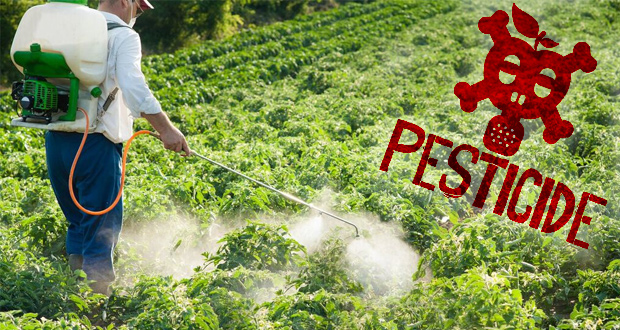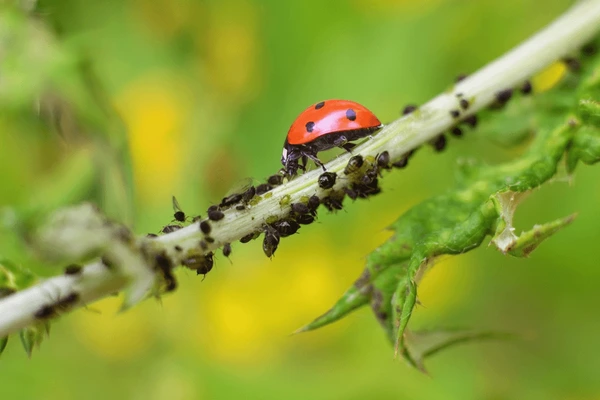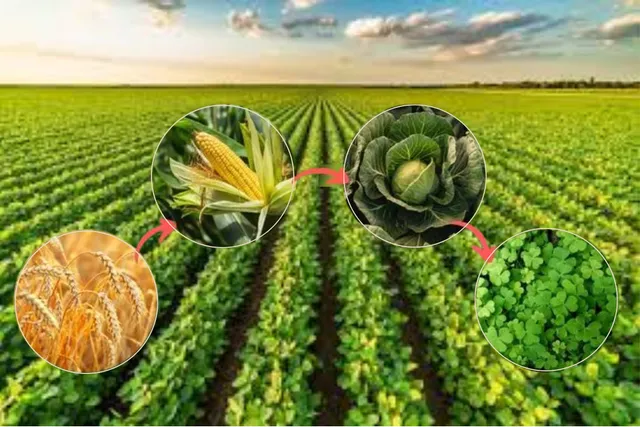Finding safe pest control services for livestock and farmers is a challenge every season. Crops need protection, but harsh chemicals can quietly put animals at risk through contaminated feed and water.
Chemical sprays may kill pests fast, yet they often leave harmful residues that affect cows, goats, and chickens over time. This creates hidden risks for both animal health and farm income.
The good news is that safer, biological pest control methods exist. In this post, we’ll explore farmer-friendly services that safeguard your crops, protect your animals, and keep your farm thriving.
Why Safe Pest Control Matters for Farmers
Safe pest control services for farmers matter because the wrong choice can harm both animals and crops.
Protecting livestock and ensuring strong harvests are the backbone of every farm. That’s why choosing the right methods is key to building healthier, more productive farms.
The Hidden Dangers of Chemicals

Chemical pesticides may seem like a quick fix, but their effects don’t stop with the pests. Over time, they can weaken soil health, disrupt natural balance, and even reduce the quality of what farmers produce whether it’s milk, eggs, or meat.
What looks like an easy solution today can quietly create bigger problems for tomorrow’s farm.
Risks for Animal Health
When animals take in traces of chemicals through feed or water, their immune systems can suffer. This stress lowers overall productivity: fewer eggs, less milk, and weaker livestock, making it harder for farmers to earn steady income.
Impact on the Farm System
Chemical overuse doesn’t just target pests; it disrupts the whole farm ecosystem. Soil fertility drops, natural pollinators disappear, and beneficial insects that protect crops are destroyed. This leaves crops more vulnerable year after year.
The Safer Path Forward
By choosing safe pest control methods, farmers can protect animals, restore soil strength, and build more reliable harvests, all of which translate into long-term profit and community trust.
What Makes a Pest Control Service Safe for Livestock?
Safe pest control services for livestock and farmers must do more than just fight pests. Not every method works well for farms with animals some protect crops but put livestock at risk. To be truly safe, a service should meet clear standards that keep both animals and harvests healthy.
No Harmful Residues
A good pest control service makes sure no toxic chemicals remain in feed, water, or grazing areas. Residues can build up in the bodies of cows, goats, and chickens, causing slow but serious health problems.
Livestock-Safe Sprays and Treatments
Some sprays may kill insects but are gentle enough not to harm animals. These livestock-safe treatments are often plant-based or biological. For example:
- Neem oil sprays – control aphids, mites, and whiteflies without harming goats, cows, or poultry.
- Bacillus thuringiensis (Bt) – a natural soil bacterium used against caterpillars, safe for livestock.
- Garlic or chili extracts – homemade or commercial versions repel pests without leaving toxic residues.
They target pests without affecting the health of animals living close to treated fields.
Integrated Pest Management (IPM)
The best services don’t just spray and leave. They use Integrated Pest Management, or IPM. This means combining methods like biological controls, monitoring, and prevention. Farmers get fewer pests without flooding the land with chemicals.
Organic and Biological Options
Farmers should look for services that use natural solutions such as neem oil, microbial sprays, or beneficial insects. These methods are safe for animals, protect the environment, and still guard crops from damage.
Why This Matters to Farmers
Safe pest control services for livestock and farmers are those that protect crops while keeping animals healthy. Not every method meets this standard, some control pests work quickly but harm livestock in the process. A truly safe service should balance crop protection, animal safety, and long-term farm productivity. Below are the options you can select from:
Biological Pest Control Options for Farmers

Safe pest control services for livestock and farmers include biological pest control methods which uses nature to fight pests. It keeps animals safe while protecting crops.
Options for Farmers
- Beneficial Insects: Ladybugs and wasps eat pests like aphids. Safe but may take time.
- Nematodes: Attack soil pests like grubs. Effective underground but needs moist soil.
- Predatory Birds and Bats: Eat insects and rodents. Natural, but farmers must support nesting.
- Microbial Sprays: Bt targets caterpillars. Safe, but works only on certain pests.
- Botanical Extracts: Neem oil or pyrethrin stop insects. Safe but need re-application.
Biological methods may work more slowly than chemical sprays, but they are much safer for livestock. For farmers considering safe pest control services for livestock and farmers, these natural approaches are often the most reliable choice.
Comparing Pest Control Services
Safe pest control services for livestock and farmers depend on the type of method used. Not all approaches are equal, some may deliver quick results but put animals at risk, while others work slower yet provide safer, long-term protection for both livestock and crops.
To help you make the right choice, here are the main differences between the types of pest control services farmers can consider:
Chemical Services
Chemical sprays and powders are common because they kill pests fast. But they often leave residues in soil, feed, and water. Over time, this can harm cows, goats, and chickens.
Biological Services
Biological methods, like beneficial insects or neem oil, work with nature instead of against it. They are safe for animals and better for soil health. Farmers may need patience, but the results are cleaner and safer.
Integrated Pest Management (IPM)
IPM combines both prevention and treatment. Farmers monitor pest levels and use biological methods first, adding mild chemicals only when necessary. This balanced approach lowers risks and keeps livestock safe.
Quick Comparison Table
| Service Type | Pros | Cons | Safe for Livestock? |
| Chemical Services | Fast results, easy to apply | Leaves harmful residues, hurts soil & animals | ❌ No |
| Biological Services | Safe for animals, improves soil, eco-friendly | Slower results, may need repeated use | ✅ Yes |
| Integrated Services (IPM) | Balanced, customized, less chemical use | Needs monitoring and farmer training | ✅ Yes |
Why the Right Choice Matters
For farmers wondering about safe pest control services for livestock and farmers, the most reliable options are usually biological or integrated methods. They may require a bit more planning, but in the long run, they safeguard animals, protect crops, and secure farm income.
How Farmers Can Choose the Right Service Provider
Safe pest control services for livestock and farmers depend largely on the provider. The right service not only protects crops but also ensures the health and safety of your animals.
What to Ask
Farmers should ask:
- Do you use livestock-safe or biological treatments?
- How do you prevent feed and water contamination?
- Do you offer prevention as well as spraying?
What to Check
Look for providers with organic or eco-friendly approvals. Choose those experienced with farms, not just homes.
Think Long Term
Safe services may cost more at first but protect animals, crops, and income over time. Farmers who choose wisely will have healthier animals and better harvests.
Best Practices Farmers Can Apply Themselves
Safe pest control services for livestock and farmers don’t always require professional intervention. Farmers can take simple, practical steps themselves to support these services, keeping animals healthy and pests under control.
Here are some easy practices you can apply on your farm to make any pest control method more effective:
Keep Barns and Pens Clean
Flies, beetles, and rodents love dirty barns. Regular cleaning, removing spilled feed, and managing waste can cut pest numbers before they spread.
Manage Manure Piles
Manure is one of the biggest breeding spots for flies. Farmers should store it away from barns, cover it when possible, or use composting to break it down faster.
Use Natural Repellents Around Animals
Neem-based sprays or herbal repellents can be applied around barns and coops. They help keep mosquitoes, flies, and ticks away without harming animals.
Rotate Crops to Break Pest Cycles

When the same crop grows in the same soil every year, pests multiply. Rotating crops makes it harder for pests to survive and protects soil health.
Try Companion Planting
Certain plants, like basil, marigold, or lemongrass, naturally repel insects. Planting them near vegetables or animal housing adds an extra layer of defense.
Farmer Benefits
By following these simple steps, farmers can manage pest problems before even contacting a professional service. For those wondering about safe pest control services for livestock and farmers, the solution lies in combining trusted professional methods with smart, everyday farm practices.
Conclusion: Protecting Both Animals and Crops
Safe pest control services for livestock and farmers are those that protect crops without putting animals at risk. Biological methods and integrated farm practices are top choices, promoting healthier livestock, stronger soil, and more dependable harvests.
Farmers don’t need to sacrifice animal safety for pest control. With the right services, both can thrive together.
Want more easy tips to keep your farm healthy?
Join our community on Instagram and TikTok @pesticontrol for practical steps and ideas.
